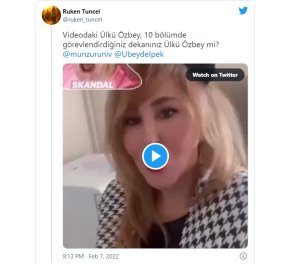Click to read the article in Turkish
bianet reporter Ruken Tuncel, who was on trial for "violating the privacy of personal life" for sharing a video that Munzur University faculty member Prof. Dr. Ülkü Özbey had previously posted on her WhatsApp status, was acquitted in yesterday's (September 21) hearing.
However, the prosecutor submitted an appeal petition to overturn the decision, even before the hearing minutes were uploaded to the National Judiciary Informatics System (UYAP).
The verdict hearing at Tunceli 2nd Criminal Court of First Instance was attended by Tuncel and her lawyer Meriç Eyüboğlu. Complainant Ülkü Özbey did not attend the hearing.
The hearing began with Tuncel's defense on the merits. Tuncel stated that she had reported on several occasions about incompetent and irregular appointments at Munzur University and that complaints had been made against her in the past, but those complaints were dismissed.
"After my reports, the Council of Higher Education (YÖK) initiated an investigation," Tuncel said. "So, my reports not only made headlines in the press but also led to an examination of Munzur University. The reason I'm here now is because previous complaints didn't yield results, and they want to get results through my recent social media post. My post is part of my journalism. I don't believe there's anything in my post that constitutes a crime. I request my acquittal."
"There is no Court of Cassation decision on WhatsApp"
Lawyer Meriç Eyüboğlu spoke after Tuncel, stating that there is no current Court of Cassation decision regarding the legal nature of posts made on WhatsApp status. However, she referred to the Court of Cassation decisions regarding Facebook and Twitter. She argued that the post did not violate the privacy of private life:
"While the Court of Cassation has many decisions regarding content shared on Facebook and Twitter, there is no recent decision regarding WhatsApp status posts. In many of its decisions, the Court of Cassation ruled that posts on Facebook and Twitter that are visible to anyone other than friends cannot be considered under Article 132 of the Turkish Penal Code (TCK) due to their publicity.
"When we take into account the detailed discussion in the Court of Cassation Plenary Session's decision about what can be considered personal data, we believe that the specific video cannot be considered personal information. My client is clearly engaged in journalism, and considering freedom of the press, we request an acquittal."
After the defense on the merits, the prosecutor at the hearing requested a prison sentence, claiming that Tuncel shared Özbey's video on social media without her knowledge and consent.
In response to the prosecutor's arguments, Meriç Eyüboğlu reiterated her position that the video does not qualify as personal information under the law due to its lack of information related to a person's identity.
Additionally, she emphasized the importance of the individual's social position, drawing attention to Özbey's public role. Following the defense statements, the court announced its verdict, stating that the legal elements of the crime were not present and acquitted Tuncel.
However, the prosecutor made a request for the preservation of the right to appeal before the decision was uploaded to UYAP.
"This could be a precedent for journalists"
After the hearing, Meriç Eyüboğlu stated in her assessment, "Considering that we are in a period where journalists' professional activities are constantly subject to legal proceedings, the acquittal decision has pleased us greatly. The prosecutor at the hearing had demanded a prison sentence, and since journalists are generally convicted in such cases, we attended the hearing with the belief that the likelihood of an acquittal was very low. However, a verdict was issued stating that journalism activities are not a crime. This is certainly positive news.
"We are eagerly awaiting the reasoned decision. If a legal debate is conducted to establish the reasons, it could set an important precedent for journalists, especially in cases related to the Turkish Criminal Code article 132 and its following articles against the disclosure of male violence by numerous women and social media users that is waved like the sword of damocles over them. Therefore, not only the acquittal decision, but also the reasons behind it are crucial."
Eyüboğlu also commented on the prosecutor's appeal, saying, "We saw that the prosecutor submitted an appeal to the UYAP system even before the hearing minutes were uploaded, while the ink on the acquittal decision had not even dried yet. We see that the prosecutor who sought a sentence is insisting on imposing a penalty. An acquittal in cases against journalists can cause discomfort sometimes."




.jpg)
